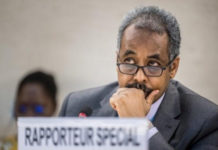Bloomberg: Eritrea May Alter Army Draft That Forced Thousands to Europe – 3rd September
- Bloomberg reports on Eritrea’s claim that it will cut the size of its army, as part of changes to a system of mandatory national service that the United Nations blames for motivating tens of thousands of people to flee to Europe and neighbouring countries.
- Rights groups and the UN said the conscription policy fuelled a wave of migration. At its peak in 2015, Eritreans were the fourth-largest group illicitly crossing the Mediterranean, adding to Europe’s refugee crisis. Eritrea describes them as economic migrants.
- Addressing the new plan for national service, Minister for Labour and Human Welfare Luul Gebreab said in an interview in Asmara that “definitely a small army will remain, and the others will concentrate on the developmental work as planned.”
- Eritrea’s government is “definitely studying” the economic effects of demobilization, according to Luul. She described “potential areas of intervention” to diversify the primarily agrarian economy that includes natural resources, agro-industry, fisheries, and infrastructure.
UNHCR: Eritrean teen finds harmony after desperate journey to Europe – 3rd September
- The UN High Commissioner for Refugees shares the story of Kokob, a 16 year-old Eritrean girl who survived the long and perilous journey across Sudan and Libya to reach Europe.
- Kokob was just 13 when she left Eritrea and her family behind. She then spent two years in a refugee camp in Ethiopia, where she made the decision to travel on to Europe. Her grandmother and other family members sold property in order to find the money she needed to pay the traffickers’ ransom and secure her freedom.
- A new report from UNHCR shows that more than 1,600 people have died or gone missing while attempting to reach Europe so far this year, and that while the total number of people arriving in Europe has fallen, the rate of deaths has risen sharply, particularly for those crossing via the Mediterranean Sea from Libya, often after a harrowing overland journey.
LabourList: We Must Lead On Reuniting Families Torn Apart By War – 3rd September
- Thangam Debbonaire, Labour MP for Bristol West and chair of the APPG on refugees, writes about the drama of separated families and the important role Britons can play in supporting refugees.
- Debbonaire writes about Aster, who was forced to leave Eritrea after being persecuted for her religion. She arrived in the UK in 2016, but was separated from her three children, who she has not seen for eight years. Her two sons are now over the age of 18, and her daughter is at risk of being conscripted into Eritrea’s notoriously brutal military.
- Debonnaire tries to gather people’s support over the project of a bill that ‘would give children refugees in the UK the right to bring family members via family reunion, allowed by the vast majority of other European countries. It would expand the definition of family so young people who have turned 18 and elderly parents can live with their families in the UK. Lastly, it would reintroduce legal aid so refugees who have lost everything have the support they need to afford and navigate the complicated process of being reunited with their families.’
Africanews: Ethiopia’s ex-rebel group Ginbot 7 returns from Eritrea base – 3rd September
- Africanews reports that a famed Ethiopian opposition group, Patriotic Ginbot 7, have officially returned to the country from their base in neighbouring Eritrea.
- Ginbot 7 is an outlawed opposition group formed after a disputed election in 2005 and named after the date in the Ethiopian calendar when the vote took place. It has claimed responsibility for numerous deadly attacks in the past.
- Until July 2018, it was considered a terrorist organisation. However, the Ethiopian Parliament voted to lift that label on the group and others like the Oromo Liberation Front (OLF) and the Ogaden National Liberation Front (ONLF).
- The group was reported crossing into Ethiopia via the town of Humera on Saturday, which is located in the northern Tigray region that shares a long border with Eritrea.
KweséESPN: Eritrea’s Merhawi Kudus holds a key to Team DiData’s revival – 3rd September
- Eritrean cycling champion Merhawi Kudus will target the steepest mountain-top finishes to back up the success of Dimension Data teammate Ben King at the Vuelta a España.
- Exactly what Kudus’ best might be has been the subject of much speculation since, as a 21-year-old in 2015, he became the youngest black African to complete the Tour de France.
- Trevor Court, Kudus’ coach at Dimension Data, said that Kudu “is the sort of rider we need from Africa – guys who step up and who don’t just wait for things to be perfect. Because the cycling world is never perfect. You have to make things happen.”
Voice of America: Russia-Eritrea Relations Grow with Planned Logistics Center – 2nd September
- Voice of America reports on the meeting between Russian and Eritrean leaders on 31 August. The two countries expanded their diplomatic relationship when Moscow announced plans to build a logistics centre at a port in the East African country.
- The scope, location and timeline of the project have not been announced, but the diplomatic development is an important milestone for both countries, looking to expand bilateral ties.
- For Russia, it’s the latest effort to forge alliances with countries in Africa, following multiple trips to the continent this year by Russian Foreign Ministry Lavrov to discuss military, economic and diplomatic partnerships.
- For Eritrea, a deepening Russia alliance is the latest sign that decades of isolation may be ending, after a historic peace deal in July with neighboring Ethiopia. Since that agreement was signed, Eritrea’s president, Isaias Afwerki, has met with leaders from Saudi Arabia, the United Arab Emirates, Somalia and South Sudan, and received delegations from Japan and Germany.







